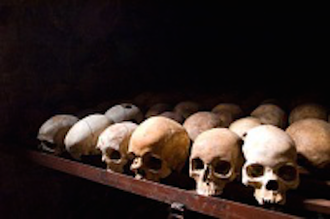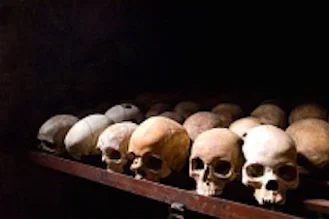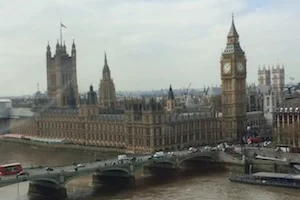Viewpoint: Crimes against humanity

Nyamata Memorial Site
It's a grim gruesome record of murder, assassination and massacre that we must condemn, denounce and learn from. The man, a leader accused of giving orders to target and kill civilians with impunity, is legendary. He convinced them that they were doing a "good" thing killing any suspect to save their nation from being destroyed.
A majority approved without question or hesitation the terrible killings and human rights violations done in his name. Thousands of innocents were shot dead, knifed and beaten to death. He killed individuals personally including a Catholic priest. He was feared and known as the "Terminator." Their belief was that killing is good and justified.
Last week, justice caught up with Bosco Ntaganda, 46. He was found guilty by the International Criminal Court (ICC) in The Hague of crimes against humanity, war crimes, murder, rape, sex slavery and using child soldiers. Ntaganda, a Rwandan Tutsi, joined rebel groups in the Democratic Republic of the Congo and also joined the Tutsi rebel army fighting against the Hutu government in Rwanda. Convicting the killer of thousands gives comfort and hope to the families of victims. Bosco Ntaganda will be sentenced in a few months time likely to a life in prison and remembered as a horrific mass murderer.
The Rwandan genocide was begun by fanatical groups of prominent Hutus in government that hated and feared the Tutsi. The Tutsi were of a different ethnic group and were more highly educated. They ruled Rwanda for years after the colonial period until the Hutu came to power through elections. Hutu and Tutsi had lived in peace for generations but there were always tensions. There were riots in 1959 during which as many as 20,000 Tutsis were killed. Many fled abroad to other African nations. There was a rebel army of exiles threatening to invade and remove the Hutus from power.
What brought about the dramatic change that led to a vicious genocide in 1994 when the Hutu population was provoked to rise up and slaughter as many as 800,000 Tutsi neighbours from April to June 1994? How could this happen and what can we learn from this terrible massacre?
A small group of extremist Hutu in government, business people and the military feared the rise of an opposition dominated by the Tutsi. They believed that the only way for them to stay in power was to create a culture of fear, loathing and hatred among the civilian Hutu and turn them against the "other" group and provoke them to slaughter every single Tutsi.
The use of media propaganda was central to this premeditated plan to which every Hutu had to belong. They worked to persuade, brainwash, convince every Hutu to hate and "belong," "to fit in," "to follow the crowd" and made hate of the Tutsi a popular and fashionable attitude. The reluctant Hutu was marked a sympathizer of the Tutsi, and if friendly to them, they would be accused of giving aid and comfort to "The Enemy."
Today we see similar attempts in the United States and elsewhere to brand Muslims, migrants, asylum seekers, addicts, black people, journalists, social activists and human rights workers as "Enemies of the People."
The extremist elite group of Hutu that were behind the plan owned the influential popular radio station RTLN. It had pop music, talk shows, interviews and hate speech in almost every broadcast. They sought to create a following among the Hutu population and convince them that the Tutsi were undesirable, evil people worse than cockroaches and had to be eliminated.
Nazi propaganda prepared and conditioned the German people to see Jews as dangerous rats and evil schemers. When the holocaust began, most turned a blind eye to the extermination of the Jews. Some saw no harm in it.
The Hutu extremists marked the Tutsi as cockroaches to be stamped upon and eliminated. They acclimatized and conditioned the population to believe that mass murder could be a virtuous act of civic duty. Soon, the failing and corrupt Hutu-led government had high approval and popularity ratings just like the Nazi party had. Likewise, other regimes use demonization, fear and hatred of a specific group of people to gain popularity and justify strong-armed rule and mass killing. Today, the Hutu extremists would be trolls using social media to achieve the same ends.
The Hutu extremists did that successfully persuading many Hutu that killing and exterminating a group of people was an okay thing to do. They branded the Tutsi using black propaganda, fake news and false accusations. They told civilians they could kill with impunity and believe it was a righteous act. Then, tragedy struck in 1994. The Hutu president was killed when his plane was shot down near the capital Kigali. The government blamed the rebels and the rebels blamed the government. It was at that moment when the Hutu unleashed the terror of mass killing against the Tutsi and the moderate Hutu.
They promised payments for killing and told Hutu if they killed a Tutsi they could take their property. Their carefully nurtured culture of hate, envy and anger provoked thousands of Hutu civilians to kill their Tutsi neighbors without mercy on the streets and in the countryside. Death squads and militia 30,000 strong named Interahamwe, meaning "attack together," led the massacre.
In a period of 100 days, as many as 800,000 Tutsi and moderate Hutu were murdered. There were men, women, and children killed mostly with machetes and clubs. Hundreds of Tutsi were burnt to death in churches and buildings where they fled for safety. It was the world's worst massacre in modern times built on a culture of hate that led to popular killing of a specific group. A majority of the people were persuaded it was right and they approved. It could happen here.
LINK
www.preda.org





















